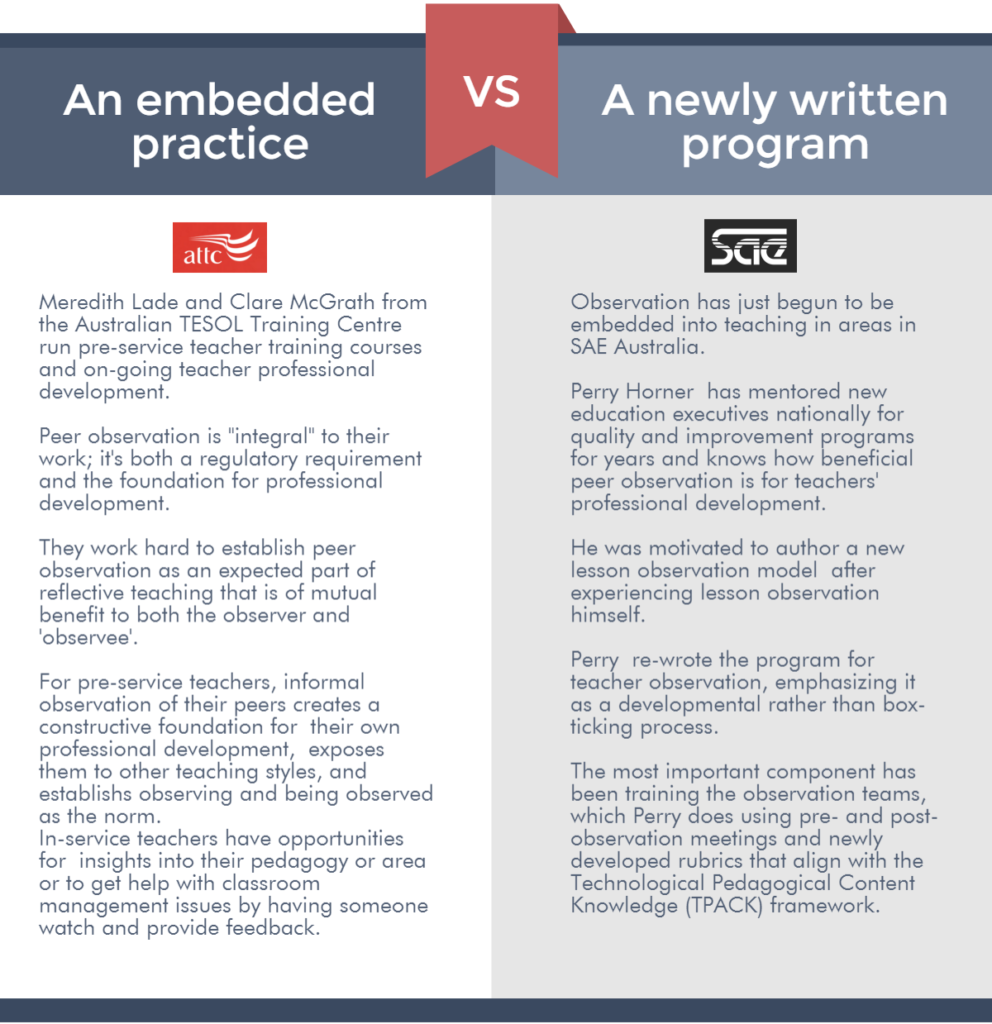Two colleges talk peer observation and lessons learned

We’re lucky at Navitas to have such a huge network of teachers that can connect, learn, share and assist one another across business units globally.
In April, we held a panel on peer observation – a very important aspect of teacher development – and heard from practitioners with experience in businesses at different levels of maturity in their peer observation programs.
What is peer observation?
Peer observation is usually between two teachers, where they agree to observe each other and provide constructive feedback on their approaches. It is a ‘curriculum conversation’ that can help encourage the sharing of teaching ideas and reflection on ways to improve our teaching practice. It might be done by sitting in on a lesson or activity or seeing a video recording of it.
Peer observation in Navitas
The panel heard from an area of Navitas where peer observation has been the norm for many years and also from one that has just begun embedding a new observation program into its learning and teaching context.

Advice from the panel
Convey the benefits clearly. Meredith Lade (ATTC) emphasised:
- Being an observer gives you a unique window into teaching and learning. You’ll always have something to take away with you.
- Being an observee is a non-threatening opportunity to get feedback on what you’re doing and help make tacit pedagogical techniques more explicit.
- For trainee teachers, peer observation promotes reflective teaching, a culture of sharing and a constructive learning process from the start.
- In-service teachers get mutual benefits, including new perspectives on content and methodologies, a developmental and non-threatening approach to professional development, greater rapport and collaboration with peers and a continual process of reflective teaching and professional development.
- Orientation to a new teaching context through direct experience of what teaching in this context looks like is cost-effective and connects peers as resources for further professional development and sharing.
When matching peers, choose a method that suits your context:
- Allow your teachers to choose, where possible, to increase their engagement. Simply ask, ‘Who would you like to observe?’ or ‘Is there a particular area, like pronunciation, that you want to observe?’
- Allow managers to match teachers if your teachers work in different locations or at different times, or know of beneficial links that could be made.
Anticipate barriers to effective peer observation:
- Low clarity. Without a clear, systematic process, the purpose and elements to focus on in the observation get lost in translation. Provide pre-observation briefings and a clear post-observation process for recording, reporting, and reflecting on the process.
- Insufficient role clarity. Remember, it’s not an evaluation or assessment, it’s about feedback, reflection and ongoing development.
- Time constraints. Provide scaffolding and minimise time obligations. (Did you see the Swivl pilot in Navitas EFS that automates video recording and uploading for teachers?)
- A lack of buy-in. Start with opportunities for short and less formal opportunities for observation and model it yourself. Consider embedding peer observation formally into teacher contracts to make it a cultural practice of ongoing professional development. Start with one-to-one observation to remove the fears associated with being seen before a big audience.
[Produced in collaboration with Georgie Lowe.]
